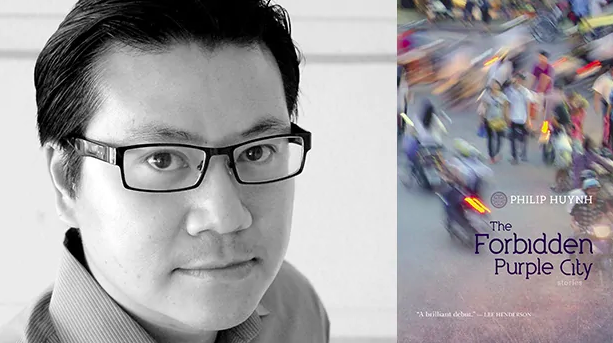The Forbidden Purple City
Philip Huynh, Goose Lane Editions
The title story of Vancouver-based lawyer-turned-writer Philip Huynh’s first book was nominated for the Journey Prize and several other stories in this collection have also won accolades. No wonder we’re excited about this collection. Often told from the point of view of a North American-born Vietnamese character, Huynh brings a fresh voice and keen eye to the way the legacies of the past weigh on the expectations of the future. This is top-notch writing from the frontlines of the Asian diaspora.
The Forbidden Purple City is part of our top Spring 2019 Indie Book Picks.
Can you speak to the overlying inspiration behind these nine beautifully crafted stories?
Certainly Vietnam inspires these stories, and the country has a distinct resonance for each of my characters. For some it stands for a painful past that they try to but can’t quite shake off, for others it is a mythical land that exists only in their imagination and blood, and yet for others it is a place of final reckoning.
Your parents are Vietnamese immigrants who fled during the Vietnam war. What role does their lived experience play in this work?
I see the world through the lens of my cultural heritage, and I owe this to my parents. Also, some of my curiosity about Vietnam is tied to my curiosity of their individual pasts. I don’t think there are any complete analogs of my parents in any one or two characters, but I do see flickers of my parents’ souls in some of their eyes.
How does the short-story format compliment and inform these pieces, as well as tie them together?
The book is broadly about the Vietnamese diaspora, and the short story “collection” is such a uniquely suitable form to explore the diversity of voices and lives within this far-flung community. Meanwhile the individual “short story” is an ideal form to investigate singular moments of profound transformation in life. The stories are all different in setting and tone, yet I hope they are linked by overlapping themes which build on each other from tale to tale.
You’re sort of a self-made literary success, as you don’t have formal creative writing education. Can you give some advice to aspiring writers from a similar background?
Spend as much time reading and writing as you can without fussing too much about following the right track to success. If this gets to be a bit lonely, then start subscribing and then submitting to the literary magazines (like Broken Pencil!). It was through literary magazines where I began to meet my peers on the page, where my words began to brush up against theirs.
Do you have a favourite story from the collection? If so, what is it and why!
I have a soft spot for “The Tale of Jude,” about two kids from the opposite sides of the track meeting in a high school in Winnipeg. Adolescence is such an intense time for everyone, and this story takes me back to the good old days of hockey bags in school buses, bullies, and counter-top dining next to the smoking section.

